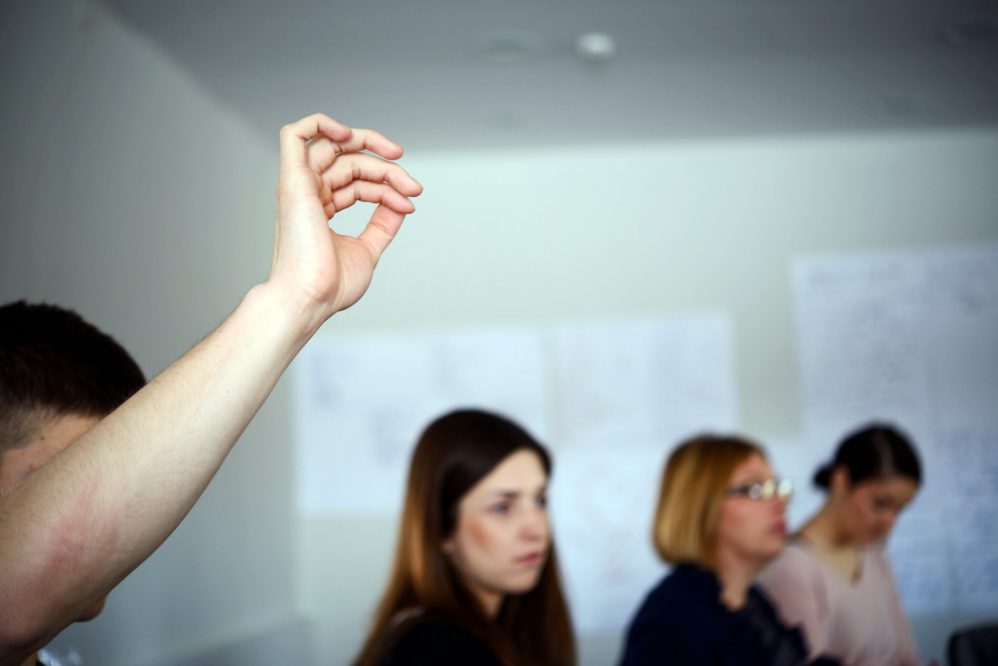The training “Introduction to Peacebuilding: Mir-Paqe-Mip 2017” was organised for the third time, through cooperation between the Centre for Nonviolent Action (CNA) Sarajevo-Belgrade and and the Action for Nonviolence and Peacebuilding (ANP) from Gnjilane, from 31 March to 9 April 2017. The training took place in Veles, Macedonia. The team of trainers was made up of peace activists from various places: Albulena Karaga (Skoplje), Nexhat Ismajli (ANP, Gnjilane) Aleksandra Bogdanovska (Skopje), Nataša Okilj (Stara Pazova) and Nedžad Horozović (Doboj/Sarajevo), all three from CNA. Exchanging experiences and drawing parallels with the Bosnian context stood out as significant and was facilitated by the new team member, helping to refresh the concept and content of the training and encourage creativity within the team.

As in the previous years, our motivation for organising this peace education programme lies in the possibility to facilitate encounters, exchange of opinions and experiences among people who, though they do not speak the same language, live in very similar societies that impact each other and that share a common past. We also see the training as an opportunity for the participants to talk about things that are usually not discussed “at home”, with people they are otherwise unlikely to meet. This enables a critical view of various narratives about the war and dominant problems in our respective societies. The training is also a place where we can be empowered to act in our local contexts, with mutual support that crosses all visible and invisible borders.
Despite the tumultuous political situation throughout the region, we received 73 applications for the training. Just like last year, Kosovo had the largest number of applications, which is indicative of the need and interest for this type of training and that, if the language barrier in our region is bridged, there is a readiness to learn about peace, although it may sometimes seem that we are “remote” from each other. Of the 20 selected participants, due to late cancellations that we could not make up for in time, we started the training with 17 participants, without Albanians from Macedonia. The group was heterogeneous, made up of 9 women and 8 men of various ages, some of them born in the 1970s and 1980s and a larger number of participants born in the 1990s.

Because the training was conducted with consecutive interpretation, the tempo was slower compared to trainings with just one language. However, since we have experience working with interpretation, in preparation, we selected the topics and methodology very similar to basic training. So, we started with a round of introductions, devoted some time to communication, teamwork, decision making, creating safe spaces and trust within the group, and them moved on to understanding conflict, violence, discrimination, identity, gender, dealing with the past and peacebuilding.
The exercises we did were adapted to working in a multilingual group with interpretation. The group was very curious, open and motivated. We invested a lot of effort in keeping up with the pulse of the group, because initially, there was a resistance to openly discussing emotions and drawing parallels between situations during the exercises and reality. By encouraging criticism and self-criticism and empowering participants to share their needs and wishes, together we managed to establish the right tempo that does not detract from the aims of the training – empowerment for action in peacebuilding. Later, the learning dynamics at the training changed, with the participants re-examining the values and behaviours demonstrated during group work and connecting those processes to the social level and their respective contexts. We opened up a lot of sensitive topics and talked about the societies we live in and about how we individually and all of us together can act to foster change. The training reached its peak during the dealing with the past workshop. Namely, illuminating dominant narratives and taboos in our societies was difficult, emotional and momentous for all of us, because it concerned dealing with how our societies function and what that means for others, who are often represented as enemies.

The language barrier between the people living in these three countries is used for petty political agendas as another divisive mechanism, but the social patterns at play in Macedonia, Serbia and Kosovo are similar, connected and necessarily feed into and impact each other. This training presented the participants with an opportunity to learn that everyone can clearly express how much it hurts to see what is being done in our societies “in our name”. This is by no means easy, but it makes us allies and provides support to those on the “other” side who want to achieve the same things we do.
As one participant said during the exercise:
“I have Albanian and Serbian friends here, and I was ashamed to say in front of them what is being said and thought about them in my community.”
Since this is the third such training we have conducted, our experience from the past and the impressions of the participants who were motivated to take on a bigger role in peacebuilding in their communities encouraged us to continue this programme. This training confirmed our projections, because personal change is a necessary step towards social change and each of us has the power to take that path and endeavour to change the society s/he lives in.
